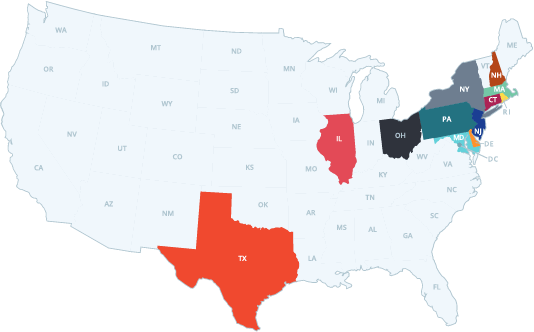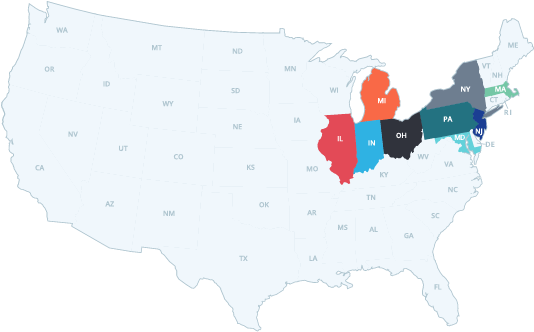Energy Savings Tips for Spring
Spring into energy savings
While you gear up for spring cleaning this year, don't miss the opportunity to increase your home's energy efficiency while you're at it. By reducing the amount of electricity and natural gas you consume, you can decrease your burden on the environment while saving real money on your utility bills at the same time. Push your household toward maximum efficiency with these energy-saving tips for spring so you can take advantage of increased energy efficiency all year round.

Save Energy on Fans and Your Air Conditioner
- Clean or replace air filters regularly so your air conditioner works efficiently.
- Consider installing a timer switch on your bathroom fan so that it runs only as long as it is required.
- Make sure your ceiling fan is running counter-clockwise to push cool air downward.
- Turn off your fan when you leave the room. Remember that a ceiling fan cools people, but not the room itself, so leaving a fan on when you're not in the room only wastes electricity.
- Choose the right air conditioner. Before buying an air conditioning unit or system, find out its energy efficiency ratio (EER). Calculate the EER by dividing the unit's cooling capacity (BTU's/hour) by its energy requirement (watts). An EER of 10 or more is very good, and 6 or 7 is fair. Remember to buy the smallest capacity unit or system that will meet your needs.
Energy-Efficiency for Doors and Windows
- Update your windows. If you have older single-paned windows, your home may not be well-insulated against the spring and summer heat. A simple fix would be to replace those windows with new, double-paned windows that are much more energy-efficient and have an Energy Star label.
- Seal air leaks. If replacing windows is not an option for you, you can add caulking or weather stripping to reduce air leakage. Determine where the leaks are by inspecting windows and doors to feel any air coming through. Once leaks are located, apply caulk to fill in the gaps.
- Install curtains or shades. Consider investing in some insulated, thermal-backed drapes for your windows. Keeping them closed during the hottest part of the day will help block out the sun and keep your room cooler.
- Keep door tracks clean. Does your home have a sliding glass door? Make sure to keep its track clean. A dirty track can ruin the door's seal and create gaps where heat or cold air can escape.
Attic Energy Efficiency
- Install ventilation. An attic ventilating system keeps hot air from crowding your attic and seeping into your home below. Consider installing attic vents and fans, or keep your existing ones free of debris.
- Add insulation. Insulation helps save energy because it acts as a barrier that keeps heat in during the winter and out during the summer.
- Seal air leaks. To maximize the efficiency of insulation, it's best to seal your attic to prevent air leaks first. You can do this by caulking, sealing and weather stripping all seams, cracks, and openings to the outside.
Energy Saving Tips for Lighting and Electronics
- Use LED bulbs. Another easy improvement is with lighting. Replace all your old incandescent light bulbs with LED bulbs. They use less energy and last longer - saving you money on your electricity bills now and in your replacement budget later. Remember to turn the lights out when you're done!
- Unplug or completely shut off electronics when you're not using them. Contrary to what you might expect, even in stand-by mode, those items still consume electricity unless they are completely shut off.
Energy Efficiency in the Kitchen
- Clean your refrigerator's condenser coils. When dust and pet hair build up on your refrigerator's condenser coils, the motor works harder and uses more electricity. As part of your spring-cleaning routine, make sure the coils are cleaned and air can circulate freely.
- Check the seals on your refrigerator door to make sure they are clean and tight. If your seals are old or dirty, they could be letting refrigerated air out and room-temperature air in, causing your fridge to work harder and use more energy.
- Use pressure cookers or a microwave oven instead of the stove to use less energy and avoid heating up your home. If you do use the oven, try to cook several items at the same time. Also, don't open the door to peek in.
- Use your dishwasher efficiently. Only run a full dishwasher, but be sure it's not overloaded. Let your dishes air dry by turning off heated dry or turning off the dishwasher after the final rinse and opening the door to let the moisture escape.
- Allow foods to partially cool before putting them in the refrigerator. It takes more energy to cool hot food.
- Look for the ENERGY STAR® label when shopping for appliances and electronics. These products are more efficient and can help reduce your energy costs.
Energy-Efficient Garage and Basement
- Add weather stripping to your garage door. The garage can be one of the largest culprits of air loss in your home. One of the easiest ways to help prevent this loss is to add weather stripping to the bottom of the garage door and the door leading from the garage into your home. This prevents outside air from coming in and air-conditioned air from escaping, and as a bonus it acts as a cushion for the garage door, which cuts down on noise when closed. If you feel a breeze on the sides of the garage door, this is a clue you need to add weather stripping tape to seal the leaks.
- Consider your garage refrigerator. Many people have a refrigerator or freezer in the garage for extra storage. This becomes a problem if you live in an area that has extreme high temperatures. Keeping the fridge/freezer at the proper temperature in extremely hot weather causes it to work harder. This is tough on the appliance and it uses more energy, which costs you more money. So, if you are set on having another fridge or freezer in your garage, think about replacing it with a model that is built "garage-friendly" and can withstand extreme temperatures.
- Have a look at your foundation walls. If you have an unfinished basement or crawlspace, check for air leaks by looking for spider webs. If there's a web, there's a draft.
- Insulate your basement. A large amount of heat can also be lost from an uninsulated basement. Check your basement to make sure it's adequately keeping cool air in and hot air out.
 CANADA
CANADA USA
USA









